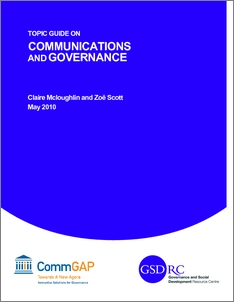The role of communications in supporting democratic development and stimulating economic growth is an essential part of the so-called ‘good governance’ agenda. However, the available research has been fragmented across multiple disciplines with often conflicting priorities, including political scien... [ more ] The role of communications in supporting democratic development and stimulating economic growth is an essential part of the so-called ‘good governance’ agenda. However, the available research has been fragmented across multiple disciplines with often conflicting priorities, including political science, communications, media studies, and development studies. There has also been little practical guidance available to policymakers on understanding and using communications in governance reform. Communications, and in particular the media, have a great deal of power in influencing governance relationships and processes. Communications are vital for connecting states with societies, facilitating inclusive political systems, giving voice to the poor and marginalised, and enabling citizen participation and social accountability. Communications advocates also argue the strategic use of political communications tools and methodologies can influence the attitudes, opinions and behaviour of key stakeholders and secure the political will necessary for reforms to be successful on the ground. With the recent rise of the fragile states agenda, there has been increased academic and donor interest in how communications can contribute to state-building by improving state citizen relationships and helping to (re)build social contracts in conflict-affected states. Nevertheless, legitimate questions remain regarding the role of donors in supporting communications in pursuit of good governance, not least what type of support is likely to be effective, what choices have to be made between supporting different types of media, and how to ensure interventions in this area are demand-led, sustainable and ultimately in the public interest; particularly the interests of the poor and marginalised. Many studies conclude there is a need for better understanding of the circumstances under which communications, and in particular the media, can be a powerful force for positive, developmental change, and why in other cases it can be a more malign force capable of blocking pro-poor reform, engendering political violence, and sustaining undemocratic political systems. This guide highlights the major critical debates surrounding the relationship between communications, government accountability and responsiveness, and state-society relations in developing countries. It is intended primarily as a reference for policymakers, and highlights practical guidance, lessons learned and case studies on supporting the development of independent and plural media systems, increasing access to information, and using communications tools in governance reform processes across a range of contexts, including fragile and conflict-affected states. | Author : Mcloughlin, Claire and Scott, Zoe Date : May 2010 Source : Technical Report. University of Birmingham, Birmingham, UK. Keywords : governance, international development, good governance, communication, media, mass media, government, politics Collection : GSDRC Topic Guides | ![[img]](/644/1.hassmallThumbnailVersion/Communication_and_Governance_topic_guide.pdf)  Preview |
|

